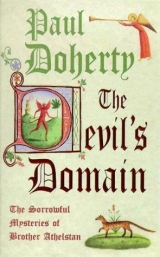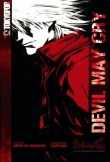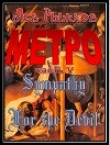
Текст книги "The Devil's domain"
Автор книги: Paul Doherty
Жанр:
Исторические детективы
сообщить о нарушении
Текущая страница: 11 (всего у книги 19 страниц)
CHAPTER 11
Sir John Cranston took one look at Sir Maurice Maltravers sitting beside Athelstan in the Jerusalem Tree Tavern and roared with laughter. He took his beaver hat off, slapping it against his thighs so the pedlars and tinkers who plied their trade along the waterside wondered if the lord coroner had lost his wits. Athelstan shook his head in mock reproval.
‘Sir John,’ he hissed. ‘This is supposed to be done in secrecy.’
‘I promise you, Brother. But do you think you can fool the hawk-eyed Lady Monica? This.’ He took the tankard Athelstan had ordered and took a deep slurp. ‘This,’ he repeated, ‘I must see. You are?’
‘Brother Norbert of the Order of St Dominic’ Sir Maurice spoke softly, pulling his face into what he thought was a look of piety.
‘Oh, for God’s sake! They’ll think you are from Bedlam if you look at Lady Monica like that. What I suggest, Brother, is Athelstan speaks to Lady Monica and you’d best keep your tongue quiet until we meet Angelica.’
They walked up the steep, winding trackway to where the nunnery, nestling behind its grey curtain wall, overlooked the Thames. A porter led them through the postern gate and across the exquisitely laid-out gardens with herbers, smooth green lawns, flower beds, arbours and raised turf seats. The air was tinged with the heavy perfume of flowers. Sir John stopped to admire a luscious rose which dangled out over the path.
‘The ladies of Syon are not sworn to poverty,’ Athelstan noted.
‘No, no, Brother, this is where the ladies of the court, who wish to retire from the glories of the world, can sit, reflect, meditate and pray.’
The nunnery buildings were made of honey-coloured stone. They passed the jewel of a chapel and entered cool, shady porticoes which wound past quiet cloisters and into the main building. Here the floor was paved and lined with boxes and pots of flowers. Gaily coloured tapestries hung on the wall displaying scenes from the Bible or lovely motifs such as a flaming rose beneath a golden crown. Now and again they passed nuns sitting in corners or in chairs, either reading from books of hours or talking softly among themselves. The porter, a wiry little man, turned a corner and knocked on an iron-studded door. Athelstan breathed a quick prayer. Sir John took one quick slurp from the wineskin and in they swept to meet Lady Monica.
Athelstan found her most forbidding. She was tall, elegant and more majestic than any queen. She was dressed in a snowy white habit with a cream-edged coif which framed an imperious face with sharp grey eyes, slender nose and thin, disapproving lips. She extended a bejewelled hand. Sir John went on one knee to kiss the long, ivory-white fingers. Athelstan and Sir Maurice bowed, the friar sketching a hasty blessing. Lady Monica sat down behind her desk while the porter, grumbling to himself, brought across three box chairs. Lady Monica nodded and all three took their seats. Athelstan felt as if he had gone back in time, to when he and his brother Francis were brought into the scullery to be reprimanded by Mother. Beads of sweat broke out on his brow and he wondered at the wisdom of what he had done. Lady Monica’s steel-grey eyes studied them all. Athelstan caught a glimpse of humour in her severe face.
‘It’s been a long time, Jack.’
Sir John’s face coloured and he shuffled his feet.
‘Do you remember the tourney?’ She sighed. ‘You and my beloved, Sir Oliver, fought all comers: the King gave you the crown as champion of the tournament?’
‘Grand days,’ the coroner muttered, the tears starting in his eyes. I am older, my lady, and much fatter, but you haven’t changed a whit. As beautiful as ever.’
‘You were always one for flattery, Jack, and for wine. Would you like some?’
Lady Monica gestured to the porter still standing behind them.
‘Cuthbert, some wine for our guests. The best claret you have.’ Her face creased into a smile. ‘Sir Jack has a partiality for that.’
The wine was served, the porter left. All the time Lady Monica threaded the ivory Ave beads which lay on her desk. She asked after Lady Maude and congratulated Sir John on the birth of the two poppets. She finally wrapped the Ave beads round her fingers and sat back in the chair. Athelstan couldn’t meet her gaze so he looked at the beautiful devotional paintings, framed in black and gold, which hung on the brilliant white walls.
‘Why are you here, Jack?’
Sir John coughed and rolled the small, intricately carved goblet between his hands.
‘Sir Thomas Parr, my lady.’
‘Ah, Angelica. Headstrong girl. Love is a terrible thing, isn’t it, Jack? It turns the soul and dazzles the mind.’ She gathered the Ave beads together. ‘Did you ever love me, Jack?’
He kept his head down like a little boy.
‘I asked you that once,’ Lady Monica continued.
‘My lady, you were betrothed. Sir Oliver was dearer to me than a brother.’
‘But you did love me!’ Lady Monica persisted.
Athelstan watched fascinated as tears brimmed in Sir John’s eyes and, for once, this bluff, rough-spoken coroner seemed tongue-tied.
‘You were always blunt, my lady. I think you know the truth. And, God forgive me if I gave any offence, but so did Oliver.’
‘My lady,’ Athelstan intervened, wanting to help his companion. ‘Sir Thomas Parr has put his daughter in your care. He has asked me to visit her and give her spiritual comfort.’
‘And does that need the three of you?’ Lady Monica studied Athelstan carefully. ‘I have heard of you.’ She pointed a finger. ‘I always listen to what happens to Jack. All your exploits. Anyway, why the three?’
‘My lord coroner is here because he knows you,’ Athelstan replied coolly. ‘I am here because I am his secretarius while Brother Norbert has just returned from the Bridgettine Convent at Oxford.’ Athelstan quietly prayed the lie would not be held against him. ‘Where he provided wise counsel and spiritual comfort for the good sisters there.’
‘And so why are you here?’ Lady Monica now stared directly at Sir Maurice.
‘I am here, my lady…’ He fell silent.
Athelstan closed his eyes.
‘You seem rather tongue-tied for one who gives spiritual comfort?’ Lady Monica’s voice was tinged with faint mockery.
‘I am here,’ Sir Maurice continued defiantly, ‘to remind Lady Angelica of love, its true nature, function and purpose.’
Lady Monica squeezed her chin between her fingers and clicked her tongue.
‘I’ve seen you somewhere before. Anyway…’ Lady Monica picked up a small bell and rang it. ‘I am charged with the Lady Angelica’s care. Any spiritual comfort you give her is because Sir Thomas Parr wishes it.’ She smiled thinly. ‘He has written to me on this matter. But,’ Lady Monica continued, ‘it must be given in my presence.’
Athelstan’s heart sank. ‘Brother Norbert’ leaned forward as if to protest but Athelstan quietly kicked his foot. The porter returned. Lady Monica gave him instructions and a few minutes later he was ushering the Lady Angelica into the room.
Athelstan could tell that this was a time of great danger. The Lady Angelica was dressed very similarly to the abbess. One look at her beautiful, heart-shaped face framed in the clinging, silken coif and Athelstan knew why Sir Maurice was so deeply infatuated. Lady Monica made the introductions. Athelstan was sure she must be able to hear his heart thumping but Lady Angelica did not betray them. She bowed at Sir John and Athelstan and, when Lady Monica explained their presence, Angelica’s eyes, cold and hard, simply dismissed Sir Maurice with one imperious flicker.
‘You say Father sent you here,’ she began, taking a seat beside the Lady Monica.
‘I know your father of old,’ Sir John replied. ‘He was determined that you be taken out of danger and not be pestered by an upstart knight.’
‘And you are here to remind me of my duty to my father?’
‘In a word, my lady, yes,’ Athelstan said.
‘And you brought this…?’ Angelica paused, her brilliant blue eyes now on ‘Norbert’. Athelstan caught a little softness as well as a sparkle of mischief. ‘You brought this good brother but what does he know of love?’
‘I know it’s God given,’ Sir Maurice replied quickly. ‘I know it never ends. I know it’s like the air we breathe and that we cannot live without it.’
‘Prettily put,’ Lady Angelica quipped. ‘I love my father but I also love someone he does not like.’ She clasped her hands in mock anguish to her breast. ‘What am I to do? How can love be contradictory?’
In any other circumstances Athelstan would have laughed at this little minx who was playing the game so coolly and so cleverly. Her eyelids fluttered.
‘If I must love my father, as I know you are going to tell me, then I must obey him. And, if I obey him, I must give up the love I have for this knight.’
‘Very well put,’ Lady Monica said. ‘Angelica, you really should enter our house of studies. Our library here is well furnished…’
‘But it’s not contradictory,’ said Sir Maurice.
‘Why is that?’ Lady Monica snapped. ‘The Fourth Commandment says thou shalt obey thy father and thy mother!’
‘In life,’ he replied, ‘there is a hierarchy, is there not? Even in this Order you, Lady Monica, are superior and the same goes for nature. Some horses are more fleet than others, some dogs more fierce. There is also a hierarchy in love, with God at its peak.’
‘And beneath that?’ Angelica asked. ‘Surely love of father and mother?’
‘That is not what Christ said,’ he replied, warming to his theme, staring fully at Angelica who now blushed. ‘He said that if a woman loves a man she should leave her kith and kin and go to him so that they become one flesh. That is God’s will and, what God has joined together, no man should try to drive asunder.’
‘Very well put,’ Angelica teased back. ‘But, Brother, I am not yet this man’s wife. I am not even betrothed.’
‘But marriages are made in heaven,’ ‘Norbert’ countered.
‘What is this?’ Lady Monica asked.
Athelstan put his hands up the sleeves of his gown and glanced sideways. Sir John was already feeling for his wineskin. Had ‘Brother Norbert’ gone too far?
‘Are you counselling the Lady Angelica to defy her father?’
‘Oh no. I was simply discussing philosophy, the true value of love and its purpose.’
‘But what is love?’ Angelica quickly spoke up to divert the Lady Monica.
‘It is the greatest of God’s gifts.’ He answered slowly as if aware that he had trodden unwarily. ‘It means giving the heart, the soul, the body to the other. It recognises no obstacle; it is pure, eternal fire.’
Athelstan raised his eyes heavenwards. He wondered whether Sir Maurice was speaking what he had read from Bonaventure’s writings or directly, from the heart. He was surprised at the young knight’s intensity and, in a strange way, he envied his burning passion. Have I, will I, ever love like this, he wondered?
‘Love has no end,’ Sir Maurice continued. ‘We are born like that, my child. I truly believe that every man and woman has two great loves: one for God and one for their spouse. Indeed, such a love reflects the life of the Trinity. As the great Bonaventure says, “As God loves the son and gives birth to the spirit which is love”, so male and female, in holy alliance, become one and create a divine life, participating in God’s creation.’
‘And it knows no lies?’ Angelica asked.
‘None whatsoever.’
‘Or division?’
‘None whatsoever.’
‘So, what shall Angelica do?’ Lady Monica asked. Athelstan noticed her face had become slightly flushed.
‘She should pray,’ Sir Maurice replied. ‘Pray with all her mind, her heart and soul that God’s will be known. My lady, it will not be Sir Thomas Parr, nor you, nor this young woman, nor even that poor unfortunate, miserable, broken-hearted…’ Athelstan kicked him on the shin. ‘Woebegone knight who will decide but God. And God loves lovers.’ He caught the steely glint in Lady Monica’s eyes. ‘His will shall decide.’
‘And until then?’ Angelica asked, drawing herself up, the laughter bubbling in her eyes. ‘Am I to stay here and pine away? Not that the good sisters here,’ she added hurriedly, ‘are vexatious but I do wonder how this will end.’
‘God will give a sign.’ Athelstan spoke up. He put his hand out and gently squeezed Sir Maurice’s knees, a reminder that he had said enough.
‘Brother Athelstan speaks the truth,’ Sir Maurice said, his eyes holding Lady Angelica. ‘He will give a sign and His will shall be known. In the end all will be well; all manner of things will be well.’
‘And will you speak to this young knight?’ Lady Monica asked.
‘Oh yes. I shall speak to him as soon as I leave here. I will seek him out.’ He held a hand up. ‘And I know what he will say, for I have met such young men before though, perhaps, none so smitten as he. He will be downcast, weeping copiously, be lost in his desolation. He will tell me that he loves this young woman more than life itself. That he will love her until death and beyond. He will say because of her, he’d storm the gates of hell and confront all the powers of darkness. How heaven and earth will pass away but his love will remain eternal. How he has given his heart to the Lady Angelica and that she will either heal it or break it!’
Lady Monica sighed noisily, her eyelids fluttering. ‘That poor, poor, young man. I shall pray for him, too.’
‘Brother Norbert. Tell him…’
‘No, no!’ Lady Monica grasped Angelica’s wrists. ‘You can send him no message, my child.’
Athelstan caught the look in the young woman’s eyes and knew there was no need. He got slowly to his feet. Sir John did likewise.
‘We must leave now,’ Athelstan said firmly. ‘But, Lady Monica, if it is agreeable to you, we will return?’
‘Oh yes, oh yes.’ The abbess wiped a tear from the corner of her eyes. ‘Sir Jack, all this brings back sweet memories.’
Cranston nodded solemnly. ‘We have seen the days, Lady Monica. Oh, we have seen the days!’
Once they left the convent of Syon, Athelstan had no objection to Sir John ‘leading them into temptation’, heading like an arrow to the welcoming darkness of the taproom in the Jerusalem Tree. Sir Maurice’s face was saturated in sweat. Athelstan found that his legs were trembling a little while Sir John was chuckling. Indeed, by the time they had ordered three tankards of good, frothy London ale, this had turned into guffaws of laughter.
‘I wouldn’t have believed that.’ He sighed. ‘Trust me, Athelstan, Lady Monica, or Isabella Fitzpercy as she was known when I was thin as a beanpole, is a formidable woman.’
‘I’ll take your word for it.’ Athelstan drank the ale rather quickly. ‘I’m going to pray to St Antony of Padua, my favourite saint, that Prior Anselm never finds out.’ He tapped his tankard against Sir Maurice’s. ‘But I warn you, if he does, you’ll have to join the Dominican Order. You’ll make a good preacher, Sir Maurice.’
‘I feel sick,’ the young knight moaned. ‘Believe me, sirs, I’ve jumped from one ship to another. I have fought hand-to-hand in the most bloody melee but I have never been so terrified.’
‘Did you love the Lady Monica once?’ Athelstan asked.
Sir John ruffled his hair and twirled his moustache.
‘In my day.’ He slurped from the tankard. ‘In my day, I was truly a lady’s man, fleet of foot, sharp of eye and keen of wit. I could dance. Oh, I could dance, Athelstan! Those were the glory days when the great Edward held his court. I mean no offence, but men like Sir Maurice were as many as pebbles on the beach. Slim as a greyhound.’ Sir John wiped the tears from his eyes. ‘Fast as a swooping hawk!’
Athelstan gazed affectionately at this great mound of generous, laughter-filled man with a body as big as his heart.
‘You did very well, Sir Maurice,’ Sir John said approvingly, then bawled for another tankard. ‘And the Lady Angelica is most beautiful. You could lose your soul in those eyes. If I were younger.’ He tapped his fleshy nose. ‘Never tell the Lady Maude but, if I were younger, Sir Maurice, I’d enter the lists against you. Oh the days!’ he sighed. ‘Oh, the passing of time!’
‘One thing I did notice,’ Athelstan said, putting his tankard back on the table. He watched a young boy sitting in the doorway, a pet weasel in his lap. ‘Lady Angelica knew nothing of that business at the Golden Cresset. Now, if that had been the work of Sir Thomas Parr, he would have let his daughter know immediately.’
‘I’ve been thinking about that,’ Sir John said, nose in his tankard. He put it down and smacked his lips. ‘I’ve asked my scrivener, Simon, a veritable ferret of a man, to seek out among the bawds and whores, the brothels and the courtesans, to discover if any young woman is missing.’
‘Sir John?’ A shadow darkened the door.
‘It’s magic. I speak the man’s name and he appears! Simon, come here!’
His spindly-shanked scrivener tottered across. Sir John offered him his tankard, which the fellow drained in one gulp. Then he smiled at Sir John’s glowering glance.
‘A message arrived for you at the Guildhall. You are needed at Hawkmere.’ He stared quizzically at Sir Maurice. ‘Don’t I know you?’
‘Mind your own business!’ Sir John snapped. ‘What’s happened at Hawkmere?’
‘One of the prisoners has escaped and Sir Walter Limbright’s beside himself with rage!’
They arrived at Hawkmere Manor dishevelled and dusty, hot and perspiring. Sir Maurice had taken off his Dominican robes and was now dressed in brown woollen leggings and white shirt, his military cloak slung over his shoulder. He had left his friar’s robes with Simon who, for a penny, had agreed to take them back across the river to St Erconwald’s.
Sir John had led them at almost a furious charge up through Farringdon Ward and across Holborn. Only now and again would he stop to catch his breath and loudly declaim, ‘A French prisoner escape! Limbright has got a lot to answer for.’
Hawkmere Manor was in uproar. The yard was thronged with soldiers and archers. Huntsmen had great mastiffs which strained at their leashes, their barking echoing round the grey ragstone walls. Horsemen came and went. Sir Walter strode up and down shouting orders, wiping the perspiration from his face. On the steps of the Great Hall his moon-faced daughter sat, picking at the ground. The three French prisoners stood nearby, closely guarded by men-at-arms. Beneath a tree, which afforded the only shade in the sun-filled manor yard, Monsieur Charles de Fontanel sat with his back to the trunk, sipping at a cup of wine and eating from a small napkin laid out on his lap. Beside him his horse, held by a greasy-haired squire, cropped at the sparse grass. As soon as he glimpsed them, Fontanel jumped to his feet and strode across as if to reach the visitors before Sir Walter Limbright noticed that they had arrived. He took off his small cap and gave the most mocking bow.
‘My lord coroner, Brother Athelstan. We meet again.’ He gestured round the yard. ‘According to the rules of war, Sir John, prisoners are supposed to be protected and well guarded. I will protest most resolutely to my Lord of Gaunt.’
‘It is not my fault,’ Sir Walter came up, his puce-coloured face covered in sweat, ‘that the prisoner has escaped!’
‘How do we know that?’ Sir John countered. ‘How do we know the poor fellow isn’t dead and his body hidden somewhere in this benighted place?’
‘Philippe Routier has escaped,’ Sir Walter insisted, not even bothering to glance at de Fontanel.
‘Show me!’ Sir John ordered.
Sir Walter led them through the manor and into the small garden behind the main house. He pointed to the far wall.
‘If you notice, Sir John, there are footholds there. Two soldiers were in the garden. A quarrel broke out among the prisoners. Routier used this to climb the garden wall.’
He led them through the garden gate and into the dusty yard beyond where he pointed to an outhouse.
‘He went through there, unobserved by the sentries, climbed through, loosened a shutter and escaped across the heath.’
‘Wouldn’t the soldiers on the wall have noticed?’ Athelstan asked.
‘No, they wouldn’t,’ Sir John replied, feeling rather sorry for Sir Walter, who was so agitated. ‘Sentries tend to look in: their job was to ensure that no one left the castle rather than broke in.’
‘Thank you, Sir John. They were also lazy. In fact, they were sitting on the parapet, Routier must have known that. Once you’re out, the land dips and falls and there are gorse bushes to hide behind.’ He shrugged. ‘But we are wasting time.’
They returned to the main manor yard. The three visitors, together with de Fontanel, joined Sir Walter and his men as they fanned out over the hot heathland. Ahead of them the grooms released the mastiffs which now ran about trying to detect the scent. Eventually one did and, followed by the rest, bounded over the sun-scorched grass towards a copse of trees in the far distance. The hounds stopped for a while where the land dipped. When Sir John reached the place, he squatted down, Sir Maurice with him. The grass here was scuffed, bread crumbs lay scattered about.
‘He paused here for a while,’ the coroner murmured. ‘But then pressed on. He ate…’
A loud howling cut him short. The soldiers were now running towards the copse of trees where the mastiffs were bounding about. A sound of a horn rose above the shouts and yelps.
By the time they reached the copse the dogs had been whipped in, leashes attached. Sir Walter was kneeling beside the corpse sprawled on the grass beneath the tree.
‘He’s dead. The poor bastard’s dead as a nail!’
The others grouped round. Athelstan knelt down. One look at Routier’s corpse was enough. The man’s skin was now a dirty white, the eyes rolled back, the open mouth stained, the tongue slightly swollen. Athelstan undid the leather jacket then the tattered shirt beneath. Purplish stains blotched the stomach and chest. The hands were cold and waxen to the touch. Beside the corpse was a water bottle and a linen cloth containing some bread and a little dried meat. Athelstan leaned across and picked them up and sniffed at them: he could find nothing amiss.
‘He could have died of apoplexy,’ Sir Walter said hopefully.
De Fontanel shook his head. ‘Routier was an accomplished sailor. A man of good physique.’
‘I am afraid I must agree with Monsieur de Fontanel,’ Athelstan said, getting to his feet. He sketched a blessing over the corpse. ‘Routier was poisoned before he left the manor.’ He pointed back over the heathland. ‘He would feel weak, perhaps the first early symptoms, so he paused where the land dips, and took some sustenance. But, by the time he reached the trees, the full effect of the poison made itself known. The poor man collapsed here and died.’
‘It’s disgraceful,’ de Fontanel said. ‘These are citizens of the French Crown. Prisoners of war, they honourably surrendered, they should be honourably treated.’
‘They are pirates,’ Sir Maurice broke in, pushing his way forward to confront the Frenchman. ‘Pirates,’ he repeated. ‘They should have been hanged out of hand. You have no proof, Monsieur de Fontanel, that Routier here was not poisoned by one of his companions.’
A quarrel would have broken out but Sir John intervened.
‘Enough!’ he bellowed. ‘Sir Walter, have the corpse removed. Monsieur de Fontanel, you are welcome to join us in our enquiries. I suggest these begin as soon as we return to Hawkmere.’
A short while later Sir John, Athelstan and Sir Maurice sat behind the table on a dais in the hall at Hawkmere Manor. Sir Walter had served some watered wine and pieces of freshly cooked chicken. Athelstan was grateful for the food and the refreshments as well as for the chance to wash his hands and face in a bowl of rose-scented water. The keeper also ushered in Aspinall the physician who had arrived just as they returned to Hawkmere. The physician had made a superficial survey of the corpse and agreed with Athelstan’s verdict.
‘No apoplexy,’ he announced. ‘Routier was murdered, the same death as poor Serriem.’
De Fontanel sat at one end of the table. He ostentatiously refused to eat or drink anything, as did the other three prisoners after the guards brought them in. Sir John ordered the doors to be locked and guarded, took one gulp of the wine and gazed darkly around. He had already taken advice from Athelstan and Sir Maurice both of whom had agreed that honesty was the best way forward.
‘There is an assassin loose at Hawkmere,’ he growled. ‘Whatever these men were, whatever they did, they are prisoners of the English Crown and deserve honourable treatment. Two have been murdered. Serriem here and Routier out on that dry heathland. The questions are how and who is responsible? Sir Walter, when Serriem’s corpse was discovered, nothing untoward was found in his chamber?’
‘Nothing, Sir John. As I said, Serriem’s corpse was found on the floor.’
Sir John turned to the three French prisoners.
‘And, to the best of your knowledge, Serriem only ate and drank what you did?’
‘Yes,’ Gresnay lisped, looking rather bored by the proceedings.
‘And the same goes for Routier!’ Maneil snarled. ‘This morning we came down to this damnable place.’ He gestured round the hall. ‘We had the usual mangy bread, smelly meat and foul drink.’
‘And Routier ate all his?’ Athelstan asked.
‘Of course he did. He was planning to escape. He needed all the sustenance he could to keep his strength up.’
‘But that’s not true,’ Athelstan replied. ‘When we found his corpse he carried a water bottle, scraps of bread and meat.’
‘I gave those to him.’ Gresnay languidly lifted a hand.
‘Why?’
‘Because he was going to escape. He told us last night.’
‘And that’s why you agreed to quarrel in the garden to divert the attention of the guards?’
‘Very perceptive,’ Gresnay drawled.
‘And why did he wish to escape?’ Athelstan continued, ignoring the jibe.
‘Because he fell in love with Sir Walter’s daughter,’ Gresnay grinned. ‘They were going to elope, just like Sir Maurice here with the Lady Angelica.’
Both Sir Walter and Sir Maurice sprang to their feet but Sir John roared at them to sit down.
‘And you, sir,’ he pointed at Gresnay, ‘will keep a civil tongue in your head or you’ll be in a dungeon in the Tower!’
‘Don’t threaten me!’ Gresnay screamed back, his face tight with anger. I am a citizen of France, a sailor. I’m kept in this fly-blown, rat-infested midden-heap and threatened. The Tower would be a welcome change!’
‘Routier escaped,’ Vamier intervened smoothly, ‘because he could no longer tolerate being confined, trapped like a bird in a snare. He thought he had seen a weakness and could use it. He would have either gone into London or some other port. Sought shelter and succour from some captain. I cannot blame him.’
‘Why didn’t you go with him?’ Athelstan asked.
Vamier shrugged. ‘His chances were poor. The more who tried to escape, the more dangerous it became. Anyway, our ransoms will be paid soon.’
‘Yes, I was going to ask about that.’ Athelstan picked up his writing bag and put it on the table. ‘Monsieur de Fontanel, these men are experienced sailors, as English shipping has discovered. Why doesn’t the French Crown pay their ransoms and have done with it?’
Athelstan was not surprised to see the prisoners nod their heads in agreement. De Fontanel spread his hands.
‘You have French prisoners at Hawkmere but you also have them in Calais, Dover, Winchelsea and Rye. The French parliament would be inundated with petitions.’ He smiled crookedly. ‘But you are right, Brother, I have pressed these men’s claims with my masters in France; their ransoms will arrive soon.’
‘But not soon enough for Routier!’ Vamier spat out.
‘I am not responsible for what happens in Paris. I do the best I can for your care.’ De Fontanel then added something quickly in French.
Vamier sat back crestfallen.
‘What was that, Monsieur?’ Athelstan asked.
‘I merely reminded him that I was not responsible for his capture.’
‘Let us return to the matter in hand.’ Sir John took a swig from his wineskin. ‘Routier was poisoned before he fled Hawkmere. You, Monsieur Gresnay, were the last to give him anything to eat or drink, which could make you the poisoner.’
‘It is also very obvious,’ Gresnay sneered back, ‘if I had given Routier poison, I would know he could not travel very far. I would expect to be accused, wouldn’t I?’
Athelstan had to agree with the Frenchman’s logic. He was about to ask further questions when the door to the hall was thrown open and a soldier clattered in, helmet in hand, his face white.
‘Sir Walter, it’s your daughter! You’d best come quickly!’








